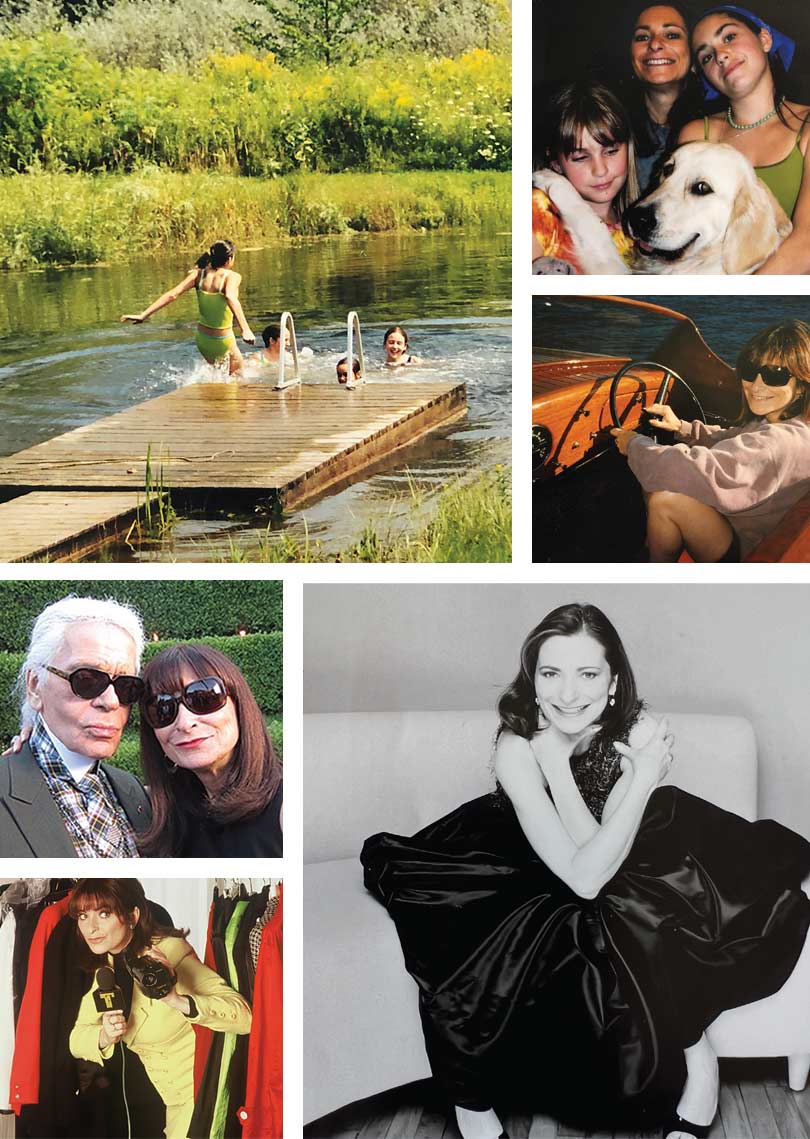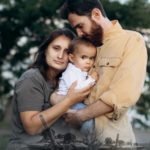
A candid conversation with the iconic Jeanne Beker
THE AIRPORT EXPRESS
It’s 1990, on any given Friday, and Jeanne Beker steps off an airplane in Toronto wearing oversized dark sunglasses. She’s arrived home from Brazil/Russia/Australia – anywhere the action was – to land in the arms of her family who are at Pearson to pick her up, like they do every Friday. It’s a family tradition and the extra large welcoming committee includes her then husband, their two girls bekky and Joey, both of their cats, and the turtle. When Jeanne’s bags are safely stowed, the group tighten up their seatbelts and head straight to the family cottage in Muskoka.
Jeanne’s at her home in Warkworth, I’m in Prince Edward County and the bright sun is streaming in through both of our windows as we get to know each other over video chat. We’re talking about our journeys and gravitating towards a different view – exchanging tall towers for flowered meadows, car horns for the honking of swans, a frantic pace for a slower one. Jeanne started the story way back, but her adventures in the great Canadian countryside run deep.
“It was a wonderful, wonderful, golden time,” Jeanne remembers, “and we spent about ten years living that lifestyle. We got out of the city and fled to the cottage most weekends, sometimes to the chagrin of the kids, you know because they missed out on a lot of birthday parties. We almost never invited guests, because it was the time for the four of us to be together as a family, and we began to get an appreciation for that kind of country life. Our place in Muskoka was a little rustic cottage built in the thirties right on the edge of a sparkling lake – it was absolutely heavenly,” she continues, “It was always important for me to have a country place. I thought, ‘I have this crazy busy, gigantic globetrotting career and time in the city is busy, so this is where I’m going to spend quality time with my family.’” But by the end of the nineties, Jeanne and her husband had divorced. The cottage stayed with him.
BLAZING TRAILS, WORLDWIDE
Jeanne is in Paris/Milan/New York/London wearing something chic that somehow maintains a Canadian vibe. Her microphone is outstretched, her cameraman is in tow. The iconic faces of Valentino/Alexander Mc-Queen/Madonna are on the receiving end and they’re about to deliver an epic sound byte. It would be something candid, uncanned and unexpected.
I grew up watching her on CTV’s Fashion Television, heart in my mouth as she chased down the great interviews from Calvin to Karl. Jeanne’s signature tenacity combined with her ability to get to the heart of the interview quickly and thoughtfully always drew gems from her subjects. Born in 1985, FT was the predecessor of reality TV and the backstage shook as Jeanne and the camera bounced after fashion’s icons, bringing us all along for the ride. Suddenly, a generation of Toronto kids had access to the pounding heart of the fashion industry in its most rock ’n’ roll era. From runway to street to afterparty, Jeanne delivered the scene up-close in a renegade way that made it accessible and cool and still unflinchingly exclusive; she never backed down from the interview and the viewers drank it up. When FT was cancelled after 27 years in 2012, celebrity stylist Brad Goreski nailed it: “[Jeanne] reported from the shows in Milan and New York with such intensity … as if she was a war correspondent reporting from the front lines.”
In the mid-2000s, I was starting my career in publishing and Jeanne was still killing it in the industry as the glamorous editor-in-chief of FQ Magazine. I climbed the rungs of the fashion mag mastheads with her in my sights – a beacon of what could be achieved in this intensely competitive industry. And then another decade had passed and I found myself pushing outside the city to forge a new adventure, a new life with my fledgling family in a bucolic region of this pretty part of Ontario. I wasn’t even a bit surprised to learn that the trailblazing Jeanne had already put down a path.
ONWARDS & EAST
Two sisters explore the grounds outside the 150-year-old stone house in Roseneath, their golden retriever bounding over the soft green grass while Jeanne works on her second book. Skyscraping hollyhocks reach impossibly high in the garden, while the pond shimmers under that yellow country sun. This is the new family photo.
Country life in Ontario can look like an old cottage with a dock on the bay. It can look like white shores and stretched out views. It can look like an old farmhouse with rows of pretty crops and it can look like this home in Roseneath that became the outpost for Jeanne’s family in its new shape for the new millennium. “He kept the cottage and I kept the house in the city because the girls were going to live with me most of the time,” she says. “My ex would have the kids every other weekend, so they could still visit the cottage, but I thought, ‘What about me? Where am I going to go on my weekends? I was so in love with that Muskoka property and being on a lake, the tall woods, everything in that little wooden cottage – but I couldn’t be haunted by the memory of that, so I decided to go for something really different.” Instead of driving north to get to Muskoka, Jeanne decided to go an hour and twenty minutes east of the city. She drove out to Northumberland in the spring, when the lilacs were in bloom. The 1840s-era stone house had three bedrooms and a pond on 123 acres. “When we drove up that long driveway through a gorgeous tunnel of trees, it was like driving into a storybook. So we got the place and the girls and I moved in.”
“ I needed to stand back and see the forest for the trees… That’s what living in the country allowed me to do.” JEANNE BEKER
Over the next two decades Jeanne bought the neighbouring property – she was originally looking for 10 acres. “There were times that I brought partners or boyfriends and times that I didn’t. It was great, but it was also kind of lonely,’ she says. “I wrote my second book out there and three kids’ books – it was such a creative, wonderful environment for me to be in. The girls loved it, the dog loved it and it was just joy – but when I was there alone, it felt too isolated.”
BEHIND THE STALL
A group of market-goers line up to engage the iconic Jeanne Beker as she sells veggies in her daughter and son-in-law’s organic produce stall at Cobourg Farmers’ market.
“It was 2015 and my mom had just died, when I met the love of my life,” Jeanne recounts. “My mom absolutely loved the farm – she thought it was paradise and I would go out there with her a lot. The girls were there for us every other weekend and they would bring their friends, but when I didn’t have anybody to go with, my mom was always happy to come with me.” Jeanne was 63 that year when her destiny walked up to her at the McMichael Art Gallery’s Moonlight Gala. “Iain MacInnes swept me off my feet and we started a relationship,” she says. “In the first year, we were up at my house in Toronto, at the farm and at his beach house in Port Stanley, but we still wanted to be together more.” Then Jeanne’s eldest daughter bekky told her mom she was dreaming about moving to the farm full-time with her then partner, now-husband Keith so they could run their animation studio while also becoming organic farmers. By 2016 the crops were planted and Jeanne and Iain had bought a new home together in Warkworth, a 14-minute drive from the farm.
THE VILLAGE LIFE CHAPTER
Jeanne leans against a tree on the Lilac Trail with Gus, the fluffy white goldendoodle, at her feet. She’s holding a paper cup of something warm from the café on Main Street. Later, when the sun was high, Gus would splash around in a reedy pond for some relief, making Jeanne and Ian smile and groan.
By the time 2021 rolled around, it had been five years and the rows of plants on the 70 acres of farmed land were officially certified organic. She’d traded in her stilettos for cross-country skis and then her skis for dog-walking wear and a walking partner. The village of Warkworth and its Main Street was an easy walk home – a circa 1850 house, situated on an acre of land that belonged to an original mill owner. “It’s just filled with charm,” Jeanne tells me, “an absolutely beautiful, well-loved house with a family that lived here for 70 years before us.” This new chapter is shaping up well.
“But Jeanne,” I ask. “Does it still feel charming, raw and authentic? Aren’t all your neighbours city expats and weekenders? Is this a cool lifestyle trend that we are leading or a genuine shift in the movement of populations and if so, what’s the driving force?”
“You know, Lonelle,” she says, “At the end of the day it’s about values. I think for me, these were values that I just, happily, came upon. I had the idea of having a life that’s so fast paced and exciting and glamorous and fabulous. You want to live it every second, but it would drive you crazy to have only that, so I needed to really be able to stand back and see the forest for the trees on a regular basis. That’s what living in the country allowed me to do.” That’s it, of course – for all of us. That duality of experience and the shifting values of city-dwellers who, alongside a global curveball, needed the green space to breathe deeper and focus on our core people.
“My parents are Holocaust survivors,” Jeanne continues, “we never had a big family unit. It was just the four of us: my mother, my father, my sister and me.” The survival drive in Jeanne, both stoked and softened by the preciousness of family is echoed in so many of our family stories. That juxtaposing spirit – pushing us to fulfill our ambition and talent in urban terrain and also retreat to nature’s reflective spaces; the flashing of cameras and the flickering of fireflies, front row at Versace and that vibrant country sunset, legs swinging freely over the edge of a pier. Home.
Story by:
Lonelle Selbo


